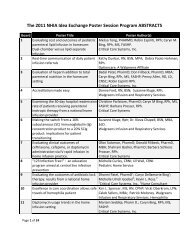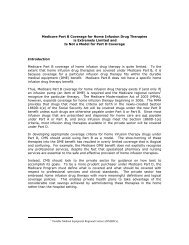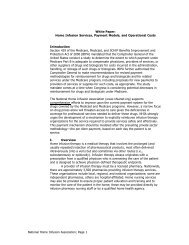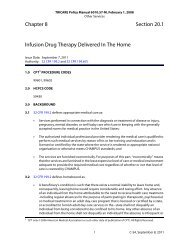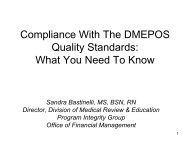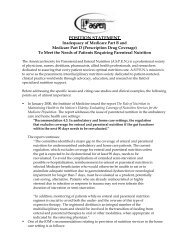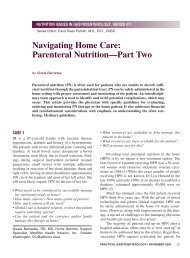are expected to rely heavily <strong>on</strong> managed care to serve the milli<strong>on</strong>s of adults who will become newlyeligible for <strong>Medicaid</strong> in 2014.In light of the large and growing role of managed care in <strong>Medicaid</strong>, and the implicati<strong>on</strong>s for <strong>Medicaid</strong>beneficiaries, the <str<strong>on</strong>g>Kaiser</str<strong>on</strong>g> Commissi<strong>on</strong> <strong>on</strong> <strong>Medicaid</strong> and the Uninsured (KCMU) and Health ManagementAssociates (HMA) c<strong>on</strong>ducted a special survey of <strong>Medicaid</strong> programs to assess the state of <strong>Medicaid</strong>managed care, identify current issues, and gain perspectives <strong>on</strong> the directi<strong>on</strong>s <strong>Medicaid</strong> managed caremay take in the coming years. This report presents data and findings based <strong>on</strong> that survey.Key FindingsNearly all states operate comprehensive <strong>Medicaid</strong> managed care programs, covering about 66 percentof all <strong>Medicaid</strong> beneficiaries. Across all 50 states and DC, <strong>on</strong>ly three states (Alaska, New Hampshire andWyoming) reported that they did not have any <strong>Medicaid</strong> managed care as of October 2010. Overall, 36of the 48 states with comprehensive managed care programs reported c<strong>on</strong>tracting with risk-basedmanaged care organizati<strong>on</strong>s (MCOs) and 31 reported operating a primary care case management(PCCM) program. Over 26 milli<strong>on</strong> <strong>Medicaid</strong> beneficiaries are enrolled in MCOs and 8.8 milli<strong>on</strong> areenrolled in PCCM programs; together, these beneficiaries in comprehensive managed care represent65.9 percent of all <strong>Medicaid</strong> beneficiaries. When <strong>Medicaid</strong> beneficiaries who receive a limited set ofservices through a managed care plan (as discussed next) are also counted, the share of all beneficiarieswho are enrolled in managed care is larger.Half the states with MCOs and/or PCCM programs also c<strong>on</strong>tract with n<strong>on</strong>-comprehensive prepaidhealth plans (PHP) to provide specific categories of services. The types of services most comm<strong>on</strong>lyprovided by n<strong>on</strong>-comprehensive PHPs, which are risk-based, limited-benefit plans, are inpatient andoutpatient behavioral health services and substance abuse treatment. A number of states also c<strong>on</strong>tractwith n<strong>on</strong>-comprehensive PHPs to provide dental care, n<strong>on</strong>-emergency transportati<strong>on</strong>, or prescripti<strong>on</strong>drugs – all services that are frequently carved out of MCO c<strong>on</strong>tracts.<strong>State</strong>s are increasingly mandating managed care for previously exempt or excluded <strong>Medicaid</strong>beneficiaries. <strong>State</strong>s have l<strong>on</strong>g mandated that most children, pregnant women, and parents and othercaretaker adults in <strong>Medicaid</strong> enroll in managed care. A majority of states reported that, for at least <strong>on</strong>e<strong>Medicaid</strong> managed care program and/or geographic area, they also mandate enrollment in managedcare for children with disabilities receiving Supplemental Security Income (SSI), children with specialhealth care needs, and seniors and people with disabilities who are not dually eligible for Medicare and<strong>Medicaid</strong>.Risk-based comprehensive managed careAlmost two-thirds of <strong>Medicaid</strong> MCO enrollees are in health plans that primarily or exclusively serve<strong>Medicaid</strong>. In additi<strong>on</strong>, for-profit plans account for a little over half of all <strong>Medicaid</strong> MCO enrollment.Roughly 60 percent of <strong>Medicaid</strong> MCO enrollees are in n<strong>on</strong>-publicly traded plans. <strong>Medicaid</strong> MCOenrollment is distributed about evenly between local and nati<strong>on</strong>al plans.Auto-assignment rates appear to vary widely. Auto-assignment rates may provide a useful signal ofhow well <strong>Medicaid</strong> beneficiaries understand the managed care system and their choices within it. Acrossthe 26 states that reported auto-assignment rates, half (13 states) reported rates of 20 percent or less;four states reported rates higher than 50 percent. More than two-thirds of states with MCOs use third-2 00
party enrollment brokers to provide plan informati<strong>on</strong> to beneficiaries and assist them in choosing anMCO; a small number of vendors dominate the market. Most states allow MCOs to c<strong>on</strong>duct outreachand marketing to <strong>Medicaid</strong> beneficiaries within federal rules.Most states set MCO capitati<strong>on</strong> rates administratively and risk-adjust their rates. Three-quarters ofthe states with MCOs reported that they used administrative rate-setting with actuaries to establishMCO rates. Other approaches states reported using are negotiati<strong>on</strong> and competitive bidding, and somestates combine multiple methods. Most states adjust their capitati<strong>on</strong> rates for age and eligibilitycategory, and about two-thirds adjust for health status. Risk-sharing arrangements with MCOs, such asstop-loss/reinsurance or risk corridors, are in place in half the states.Over half the states with MCOs include a pay-for-performance (P4P) comp<strong>on</strong>ent in their payment toplans. Capitati<strong>on</strong> withholds and b<strong>on</strong>us payments were reported most frequently. Examples of otherapproaches are shared savings, auto-assignment preference, and enhanced capitati<strong>on</strong>.A limited number of states have a minimum medical loss ratio (MLR) requirement for MCOsparticipating in <strong>Medicaid</strong>. Eleven states indicated that they have a minimum MLR requirement forplans, 21 states reported that they do not, and three states said they plan to establish <strong>on</strong>e in the future.Minimum MLRs ranged from 80 percent in three states to 93 percent in <strong>on</strong>e state for MCOs serving agedand disabled <strong>Medicaid</strong> beneficiaries.All states but <strong>on</strong>e “carve out” at least <strong>on</strong>e acute-care benefit from their MCO c<strong>on</strong>tracts, but severalstates are carving some benefits back in. More often than not, dental care and outpatient and inpatientbehavioral health care are carved out and provided either <strong>on</strong> a fee-for-service basis or by a n<strong>on</strong>comprehensiveprepaid health plan (PHP) – a risk-based, limited-benefit plan. Other comm<strong>on</strong> carve-outsare outpatient substance abuse treatment, n<strong>on</strong>-emergency transportati<strong>on</strong>, and pharmacy services.Some states that previously carved out the pharmacy benefit or other <strong>Medicaid</strong> services are carvingthem back into their MCO c<strong>on</strong>tracts or plan to do so.<strong>State</strong>s use a variety of network adequacy standards. <strong>State</strong>s typically use provider-to-populati<strong>on</strong> ratiosand distance and travel-time maximums as standards to ensure that MCO networks are adequate. Theygenerally apply different standards for primary and specialty care and frequently apply differentstandards for rural and urban areas. The standards states use vary widely. In most states, in additi<strong>on</strong> toprimary care physicians, providers such as ObGyns, nurse practiti<strong>on</strong>ers, federally qualified healthcenters, and physician groups/clinics are recognized as primary care providers (PCP) for MCO enrollees..Many but not all states reported that <strong>Medicaid</strong> MCO enrollees sometimes face access problems. Overtwo-thirds of resp<strong>on</strong>ding states with MCOs reported that <strong>Medicaid</strong> beneficiaries enrolled in MCOssometimes experience access problems. Problems with access to dental care, pediatric specialists,psychiatrists and other behavioral health providers, and other specialists (e.g., dermatologists, ear-nosethroatdoctors, orthopedists and other surge<strong>on</strong>s, neurologists, cancer and diabetes specialists) were allcited. At the same time, improved access to care – both primary and specialty care – was the mostfrequently cited perceived benefit of managed care relative to fee-for-service. Some states indicatedthat where an access problem existed, it usually paralleled a similar problem encountered by pers<strong>on</strong>swith other types of insurance, for example, due to provider shortages and other market factors. Thesurvey, however, did not directly collect informati<strong>on</strong> <strong>on</strong> access problems in fee-for-service <strong>Medicaid</strong>.3
- Page 1 and 2: kaisercommission onmedicaidand theu
- Page 3 and 4: kaisercommission onmedicaidand theu
- Page 5 and 6: Table of ContentsExecutive Summary
- Page 7: EXECUTIVE SUMMARYMedicaid, the publ
- Page 11 and 12: HEDIS©, CAHPS©, and state-specifi
- Page 13: ConclusionFor over 30 years, state
- Page 16 and 17: from the recession and the slow rec
- Page 18 and 19: A note on Medicaid managed care ter
- Page 20 and 21: Managed caremodelTable 1: Medicaid
- Page 23 and 24: States are increasingly mandating m
- Page 25 and 26: States with Medicaid MCOsKey Sectio
- Page 27 and 28: States have “auto-assignment” a
- Page 29 and 30: excess of a specified threshold for
- Page 31 and 32: Dental care and outpatient and inpa
- Page 33 and 34: the second trimester, and within th
- Page 35 and 36: eported that they limit PCP panel s
- Page 37 and 38: States with non-comprehensive PHPsK
- Page 39 and 40: Measuring, monitoring, and improvin
- Page 41 and 42: seven states required 10 measures o
- Page 43 and 44: CAHPS© surveys. North Carolina is
- Page 45 and 46: Special initiatives to improve qual
- Page 47 and 48: public health efforts to reduce dis
- Page 49 and 50: Medicaid managed long-term care and
- Page 51 and 52: (e.g., need to credential Adult <st
- Page 53 and 54: In many states, broader efforts foc
- Page 55 and 56: Looking ahead: Medicaid managed car
- Page 57 and 58: ConclusionFor over 30 years, state
- Page 59 and 60:
APPENDIX 2: Summary of Medicaid Man
- Page 61 and 62:
Program Name(e.g., Popular Name, 19
- Page 63 and 64:
APPENDIX 3: MCO Contracts, Plan Cha
- Page 65 and 66:
State(No. ofcontracts)NameEnrollmen
- Page 67 and 68:
State(No. ofcontracts)NameEnrollmen
- Page 69 and 70:
APPENDIX 5: MCO Capitation Rate-Set
- Page 71 and 72:
APPENDIX 7: MCO Network Adequacy Re
- Page 73 and 74:
State Primary Care Obstetric Care S
- Page 75 and 76:
APPENDIX 9: Providers Recognized as
- Page 77 and 78:
APPENDIX 11: PCCM Administrative Se
- Page 79 and 80:
APPENDIX 13: Initiatives to Improve
- Page 81 and 82:
I. MANAGED CARE OVERVIEW1. Total Ma
- Page 83 and 84:
4. Enrollment Requirements.a. We ar
- Page 85 and 86:
ii. Please indicate whether the fac
- Page 87 and 88:
c. Required Providers: We are inter
- Page 89 and 90:
IV. NON-COMPREHENSIVE PREPAID HEALT
- Page 91 and 92:
. Does your state use CAHPS© surve
- Page 93 and 94:
VI. SPECIAL INITIATIVESAll states s
- Page 95 and 96:
Appendix I: Managed Care Contracts1
- Page 97:
Appendix II: Clinical Quality Perfo
- Page 100:
1330 G S T R E E T NW, W A S H I N



